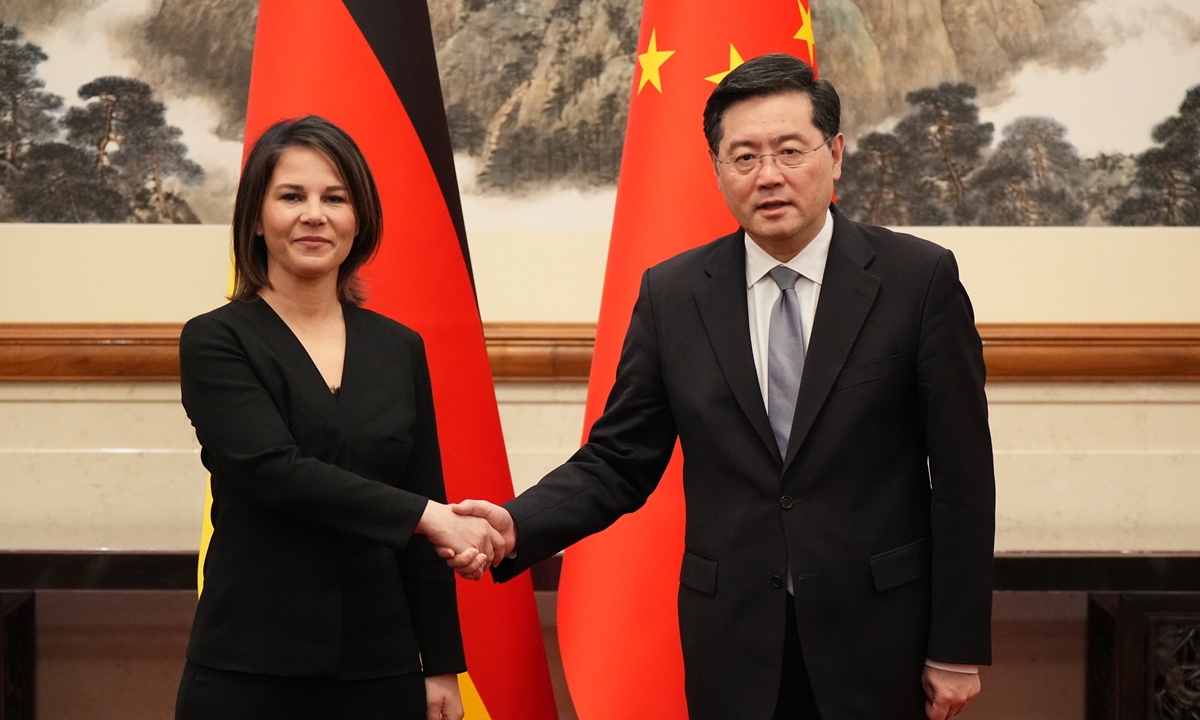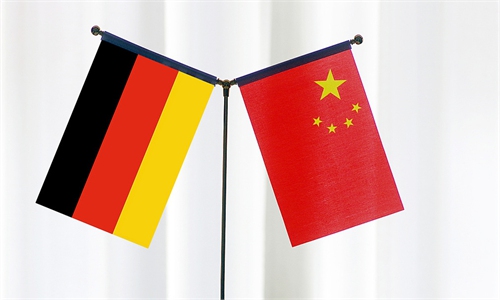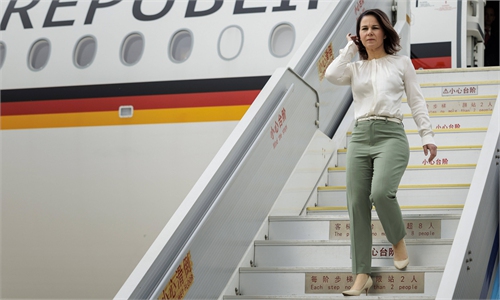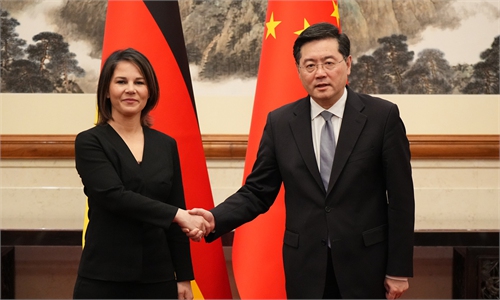
Chinese State Councilor and Foreign Minister Qin Gang and visiting German Foreign Minister Annalena Baerbock shake hands at the Diaoyutai State Guesthouse in Beijing on April 14, 2023. Photo: IC
Chinese State Councilor and Foreign Minister Qin Gang visited German companies with German Foreign Minister Annalena Baerbock in Tianjin on Friday, and then took the high-speed train with her to Beijing. It should be said that these courtesies given by China to the German foreign minister show Beijing's broad-mindedness.
The EU's foreign policy is mainly determined by France and Germany. Baerbock and German Chancellor Olaf Scholz belong to the Green Party and the Social Democratic Party respectively. Baerbock can roughly represent half of the current German government's attitude towards China. She can be regarded as a hardliner toward China in Germany. The American and British media have had high expectations that she can "revise" Macron's remarks regarding China.
The main task of Baerbock's visit to China is to co-chair the sixth round of China-Germany Strategic Dialogue on Diplomacy and Security with Qin Gang. Her public statements to the media seem to have taken a "middle course." According to a Deutsche Welle report, Baerbock said in Tianjin last night that Macron had "once again emphasized that France's China policies reflected EU China policies one-to-one." She said the strengths of the EU lay in the fact that "we are not only close to each other, but pursue joint strategic approaches on the central issues of our interests and values." The Deutsche Welle report said, "In China, Germany's Baerbock says EU on same page as Macron," and commented that Baerbock "appears to have backed French President Macron's stance."
But on Friday, Baerbock also said something Western journalists would like to hear. Regarding the Taiwan question, she claimed that "a unilateral and violent change in the status quo would not be acceptable to us as Europeans." On the Ukraine issue, she said the Chinese position "does not include a call on the aggressor Russia to stop the war," and said "no other country has more influence on Russia than China." She also pointed an accusing finger at China's human rights issue.
Baerbock is undoubtedly one of the German politicians who would most like to talk tough on China-related issues. On Thursday and Friday, she visited various German factories in Tianjin. So far, there have been no reports saying that she stresses that "do not one-sidedly depend on China" on these occasions. The message generally sent is that she supports or does not oppose German companies to cooperate with China. Baerbock recently said, "We should de-risk our relations with China. It doesn't mean decoupling from China, but we must reduce one-sided dependencies."
Regardless of Germany or Europe, the core part of the relationship with China is economic cooperation. Taiwan is too far away from them, and they do not have the power to actually intervene in the question of war and peace there. "Human rights" is an old-fashioned topic. On the Ukraine issue, they want China to agree with them, but they themselves know that they cannot dictate China.
Former German Chancellor Angela Merkel backed strong China-Germany relations. The incumbent government has swayed back a bit, with Baerbock representing the upper limit of that sway. Her visit to China this time allows people to see the strength and limitations of her push to reverse Germany's China policy. It is most convenient for her to say some tough words compared with Scholz and Macron, but she has to remain cautious on the issue of Germany's actual interests.
Macron's promotion of European strategic autonomy and his statement that Europe should avoid being involved in a crisis "that's not ours" on the Taiwan question have brought real shocks. European Council President Charles Michel, French Finance Minister Bruno Le Maire and other heavyweight politicians publicly supported him. Ursula Von der Leyen, who visited China with Macron, did not speak out about Macron's words, and remained silent in a rare manner. Her Twitter account has not been updated since her visit to China.
Although Baerbock, who is widely expected by American and British public opinion, said something different from Macron, she did not criticize Macron, but expressed a "solidarity" attitude with Macron.
So which direction is the current wind blowing in Europe on China-related issues, what is the future trend, what is superficial and what is real, I believe everyone will have a judgment.
The author is a commentator with the Global Times. opinion@globaltimes.com.cn




